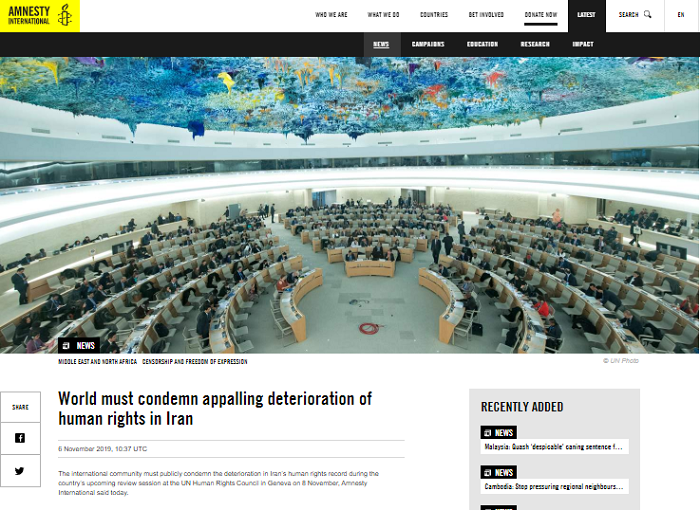
Amnesty International calls on publicly condemn the deterioration in Iran’s human rights record during the country’s upcoming review session at the UN Human Rights Council in Geneva on 8 November”
On November 6, 2019, Amnesty International released a statement calling the international community to “publicly condemn the deterioration in Iran’s human rights record during the country’s upcoming review session at the UN Human Rights Council in Geneva on 8 November”
The organization urges states taking part in Iran’s Universal Periodic Review (UPR) to denounce the widespread human rights violations and make concrete recommendations for the Iranian authorities to address them.
“From horrific execution rates to the relentless persecution of human rights defenders, rampant discrimination against women and minorities, and ongoing crimes against humanity, the catalog of appalling violations recorded in Iran reveals a sharp deterioration in its human rights record,” said Philip Luther, Research and Advocacy Director for the Middle East and North Africa at Amnesty International.
UN Must Hold #Iran Regime Accountable for 1988 Massacre, Other Human Rights Abuses – Amnesty International https://t.co/bwA9OKzB8v#1988Massacre #NoImpunity4Mullahs
— NCRI-FAC (@iran_policy) November 7, 2019
It is worth noting that on September 20, 2019, Human rights experts from various countries took part in a conference held at the United Nations European Headquarters in Geneva, calling to end the three-decade-long impunity Iranian regime officials have been enjoying in relation to continuing human rights violations across the country, and especially the 1988 massacre of political prisoners. Over 30,000 political prisoners, mainly members and supporters of the Iranian opposition Mujahedin-e Khalq (PMOI/MEK), were then executed in just a few months.
“Why should there now be a tribunal on the crime against humanity committed in 1988? First, because lawyers have examined evidence and know beyond doubt that a crime was committed. If Iran disputes that, we have a process for that,” Kristy Brimelow, QC, an international human rights lawyer, said in her remarks.
“In July 2019, Mostafa Pourmohammadi, mullahs’ former minister of justice, responded to allegations of 1988 executions and defended them as the execution of terrorists. But evidence shows the contrary. Many of the people had been arrested for distributing leaflets, many were children.”
“It is time that we write the history within the judicial setting as to what happened in 1988, and this crime against humanity must be recognized beyond political goals, but within its judicial context. Otherwise, what’s the point of the UN?” said Swiss MP Laurence Fellman Rielle
“We are witnessing progress in seeing the perpetrators of this crime being brought before a court. Since launching the campaign for justice for the 1988 massacre victims, many of the perpetrators have been exposed and the crime has been documented,”.
“Amnesty International has also rallied to expose this crime. It has underlined that if the perpetrators are not held to account before a tribunal, more crimes and massacres will take place. Amnesty called it a crime against humanity. Amnesty has also gathered testimonies from hundreds of witnesses,” she added.
Henrik Hermansson, a political scientist and human rights researcher, reminded the conference of a number of reports covering the 1988 massacre.
“We have the locations of 60 mass graves… The 1988 massacre shaped Iran’s political system. The massacre was carried out by many authorities. Many death commission members now hold important positions in the government,” he explained.
Seeking justice for the victims of the #1988Massacre, and for all the oppression inflicted on the people of #Iran is a nationalist commitment. It is our commitment and our steadfast resolve to achieve freedom. It is a staunch pledge to overthrow the mullahs’ theocratic regime. pic.twitter.com/FZ1w9PN3RB
— Maryam Rajavi (@Maryam_Rajavi) October 30, 2019
“Iran’s large financial institutions are controlled by the perpetrators. Iran’s current supreme leader, who was the regime’s president in 1988, was directly involved. The 1988 massacre became a career-making moment for many Iranian officials.
“When officials are trained on the mass murder of dissidents, mass murder is how they will respond to protests. The continued impunity of this crime contributes to this continued crime.
“We should understand impunity is a cause of human rights violation and a violation of itself. There’s still a role for the UN and international human rights community to end impunity, even if it has political ramifications.
“I call on member states to discuss the 1988 massacre with the Special Rapporteur to make sure it’s not dropped again. Failure to investigate is also a crime,” he concluded.
